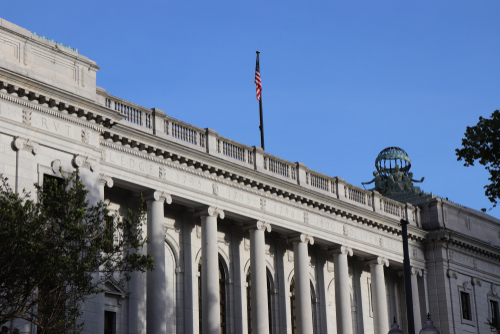
- Bipartisan Group of Senators Re-Introduce the Digital Asset Money Laundering Act
On July 28th, a group of Senators (Elizabeth Warren (D-Mass), Roger Marshall (R-Kan.), Joe Manchin (D-W.Va.) and Lindsey Graham (R-S.C.)), reintroduced the Digital Asset Anti-Money Laundering Act (the “Act”), legislation aimed at closing gaps in the existing anti-money laundering and countering of the financing of terrorism (AML/CFT) framework as it applies to digital assets.
The Act defines an “unhosted wallet” as “software or hardware that facilitates the storage of public and private keys used to digitally sign and securely transact digital assets, such that the stored value is the property of the wallet owner and the wallet owner has total independent control over the value.” It defines a “validator” as a person or entity that “processes and validates, approves or verifies transactions, or produces blocks of digital asset transactions to be recorded on a cryptographically secured distributed ledger or any similar technology.” This latter definition appears broad enough to include digital asset miners. If so, and depending upon how FinCEN crafted the implementing regulations, this could be in significant tension with FinCEN’s 2014 guidance which opined that miners need not register with FinCEN as money service businesses (MSBs) covered by the BSA, so long as the miner used the digital assets for its own purposes.
For more information: SIL23929 (moneylaunderingnews.com)
- Making headway – Results of the 2022 BIS survey on central bank digital currencies and crypto/ BIS
On July 10, 2023 the BIS (Bank for International Settlements) published the results of a survey regarding central bank digital currencies (CBDSs). The survey stated that Most central banks are exploring CBDCs, and more than half of them are conducting concrete experiments or working on a pilot. This BIS paper summarizes the findings of the latest survey of central banks on their views and plans regarding CBDCs. The responses from 86 central banks show that the proportion engaged in some form of CBDC work has risen to 93% and that the work on retail CBDC is more advanced than on wholesale CBDC. In addition, this paper shows that most central banks see potential value in having both a retail CBDC and a fast payment system, and that there could be 15 retail and nine wholesale CBDCs publicly circulating in 2030. The survey further shows that, to date, stablecoins and other cryptoassets are rarely used for payments outside the crypto ecosystem.
For more information: Making headway – Results of the 2022 BIS survey on central bank digital currencies and crypto
- CFPB Takes Action Against Bank of America for Illegally Charging Junk Fees, Withholding Credit Card Rewards, and Opening Fake Accounts / CFBP
On July 11, 2023 the Consumer Financial Protection Bureau (CFPB) ordered Bank of America to pay more than $100 million to customers for systematically double-dipping on fees imposed on customers with insufficient funds in their account, withholding reward bonuses explicitly promised to credit card customers, and misappropriating sensitive personal information to open accounts without customer knowledge or authorization. The Office of the Comptroller of the Currency (OCC) also found that the bank’s double-dipping on fees was illegal. Bank of America will pay a total of $90 million in penalties to the CFPB and $60 million in penalties to the OCC.
For more information: CFPB Takes Action Against Bank of America for Illegally Charging Junk Fees, Withholding Credit Card Rewards, and Opening Fake Accounts | Consumer Financial Protection Bureau (consumerfinance.gov)
- MAS to Strengthen Defence Against Money Laundering Risks in Single Family Offices / MAS
On July 31, 2023 the Monetary Authority of Singapore (MAS) launched a public consultation on a revised framework to strengthen surveillance and defence against money laundering (ML) risks in Singapore’s Single Family Office (SFO) sector. The revised framework will introduce a harmonised class exemption for SFOs with specific requirements to ensure that all SFOs are subject to anti-money laundering controls.
Currently, as SFOs do not manage third-party assets, they can either rely on existing class exemptions from licensing requirements under the Securities and Futures Act or apply to MAS for case-by-case exemptions. To strengthen surveillance and defence against ML risks in the SFO sector, MAS proposes to harmonise the exemption criteria for all SFOs operating in Singapore.
For more information: MAS to Strengthen Defence Against Money Laundering Risks in Single Family Offices
This update is provided as general information only and may not be relied upon in any individual case without additional legal advice.










